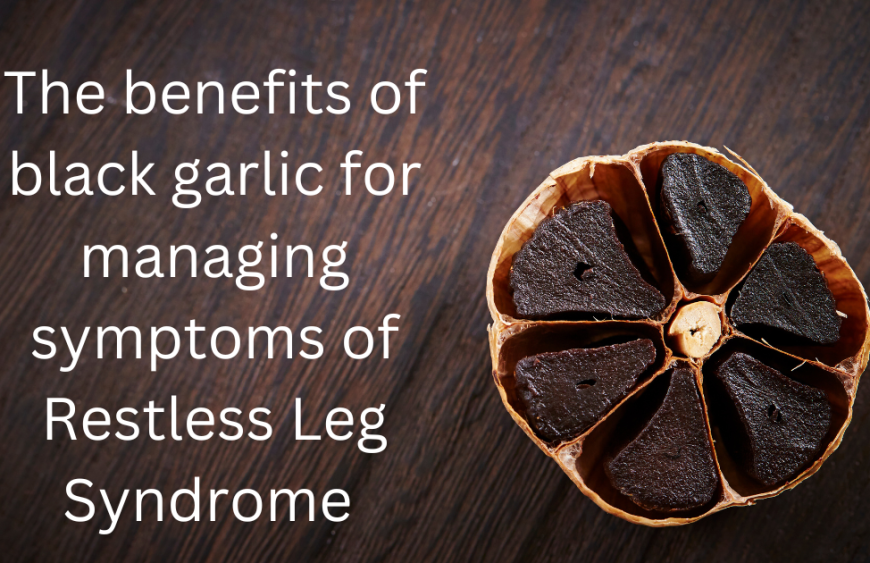The benefits of black garlic for managing symptoms of Restless Leg Syndrome

Restless Leg Syndrome (RLS) is a neurological disorder characterized by an irresistible urge to move the legs, often accompanied by uncomfortable sensations. While there is limited scientific research specifically focusing on the benefits of black garlic for managing RLS symptoms, black garlic’s potential health-promoting properties may have some indirect effects. Here are a few aspects to consider:
- Nutrient Content:
- Black garlic contains various nutrients, including vitamins, minerals, and antioxidants. While the direct impact on RLS is not established, a nutrient-rich diet is generally associated with overall well-being.
- Anti-Inflammatory Properties:
- Some compounds found in black garlic, such as S-allyl cysteine, have been studied for their potential anti-inflammatory effects. Inflammation is thought to play a role in certain neurological conditions, including RLS.
- Antioxidant Effects:
- The fermentation process that transforms regular garlic into black garlic increases its antioxidant content. Antioxidants help neutralize free radicals, and there is a theoretical link between oxidative stress and neurological conditions.
- Potential Impact on Circulation:
- Garlic, in general, has been associated with potential benefits for cardiovascular health and blood circulation. Improving circulation may have indirect effects on managing RLS symptoms, as circulatory issues are sometimes linked to the disorder.
Ways to Incorporate Black Garlic:
- In Cooking:
- Use black garlic in various savory dishes, such as stir-fries, sauces, and marinades. Incorporating it into your meals can provide a unique flavor and potentially contribute to overall well-being.
- Supplementation:
- While black garlic is typically consumed as a food ingredient, black garlic supplements are also available. However, before considering any supplementation, it’s important to consult with healthcare professionals to ensure it is appropriate for your individual health needs.
Important Considerations:
- Individual Responses:
- Responses to dietary choices can vary. What works for one person may not have the same effects on another. It’s important to observe how your body responds and consult with healthcare professionals for personalized advice.
- Holistic Approach:
- Managing RLS often requires a comprehensive approach that may include lifestyle changes, sleep hygiene, and, in some cases, medications. Dietary changes, including the incorporation of black garlic, should be considered as part of a broader strategy.
- Consultation with Healthcare Professionals:
- If you are experiencing symptoms of Restless Leg Syndrome, it’s crucial to consult with healthcare professionals for a proper diagnosis and guidance on appropriate management strategies.
While black garlic may have potential health benefits, especially in terms of its antioxidant and anti-inflammatory properties, it is not a substitute for professional medical advice or treatment. If you have concerns about RLS or any other health condition, seeking guidance from healthcare professionals is recommended for an accurate diagnosis and appropriate management.
Related Articles
Recent Comments
Recent Posts
Tags
A2 milk Aged garlic Anti-inflammatory Ayurvedic medicine Bilona method Black garlic bread Black garlic chicken Black garlic extract Black garlic hummus Black garlic mayonnaise Black garlic oil Black garlic paste Black garlic powder Black garlic recipes Black garlic salt Black garlic seasoning Black garlic shrimp Black garlic steak Black garlic supplements Black garlic tofu Black garlic vinegar Butyric acid Conjugated linoleic acid (CLA) Cooking oil alternative Digestive health Fat-soluble vitamins Fermented garlic Gir cow Grass-fed cows Gut bacteria Health benefits Health benefits of black garlic Natural ghee Nutritious fat Omega-6 fatty acid Organic ghee Pure butterfat Pure ghee Rich flavour Roasted garlic Spread alternative Sweet garlic Traditional churning method Traditional Indian ghee Umami flavour




